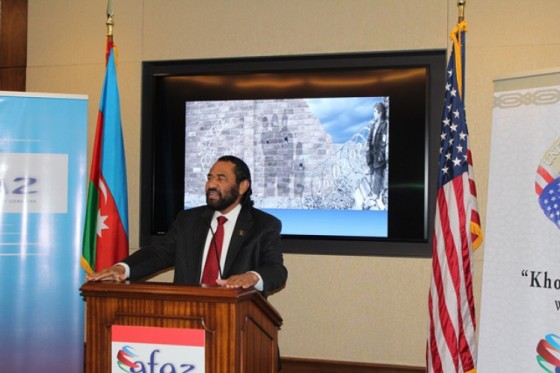
At least sixteen US lawmakers attended a reception held at the US congress to mark the 23rd anniversary of the Khojaly tragedy, reiterating US partnership with Azerbaijan and remembering innocent Azerbaijani men, women and children who were slaughtered during a brutal war with neighboring Armenia.
The members of the US Congress paid tribute to more than 600 killed in the town of Khojaly in Nagorno-Karabakh in 1992, when the war between Armenia and Azerbaijan had been escalating. Armenian militias invaded the town, killing hundreds of Azerbaijani civilians while hundreds of others who fled the town through a nearby forest were frozen to death at night.
US Ambassador to Azerbaijan Elin Suleymanov characterized the Khojaly incident as the “most tragic event in the post-Soviet space at the end of the 20th century.”
“We look back to remember what happened not to take revenge but to remember that lasting peace must come as soon as possible,” Suleymanov said, adding that it was for this reason that the Azerbaijani government insisted on comprehensive talks and a peace agreement between the two warring countries “to move forward and to build a united region to benefit Azerbaijani and Armenian people as well as the entire region.”
The ambassador said remembering the victims of Khojaly is essential to build a better future and a lasting peace that is based on the international law, understanding of freedom, human rights and regional integration.
Hosted by Rep. Henry Cuellar of Texas at the US Congress, Azerbaijani deputies Asim Mollazade and Sevinj Feteliyeva, French lawmaker Natalie Goulet were also among the attendees.
Rep. Bill Shuster from Pennsylvania said Azerbaijan has been a great partner and an ally of the US and that it takes a courage to be an American ally for a country that is located in a hostile neighborhood, Russians to the north and Iranians to the south. Shuster, who is also the co-chair of US-Azerbaijani Caucus said “we remember the people who have been massacred in Khojaly.”
If the US took notice of what was happening in that part of the world, the congressman added, it would be possible for Washington to predict what would follow next, referring to the tragedy.
“Khojaly should be a lesson, a reinforcement that we have to stand stronger with our allies,” the congressman stressed.
Rep. Ryan Zinke from Montana described Azerbaijan as a “critical friend and an ally” and reminded that one third of military supplies to Afghanistan went through Azerbaijan. Recognizing that Azerbaijan is located in a tough neighborhood, Zinke said it is not “easy to be an ally of the US.”
Rep. Xavier Becerra from California equally hailed the friendship with Azerbaijan as a “strategically important” asset, highlighting the significance of boosting dialogue and deepen relations between the two countries.
Rep. Robert Aderholt from Alamaba, Rep. Al Green from Texas, Rep. Randy Hultgren from Illinois, Rep. Brian Babin from Texas, Rep. Charlie Dent from Pennsylvania, Rep. Marc Veasey from Texas, Rep. Yvette Clarke from New York, Rep. Pual Gosar from Arizona, Rep. Doug Lamborn from Colorado, Rep. Ted Deutch from Florida and Rep. Sheila J. Lee from Texas were among the participants.
Pete Olson from Texas said during the event it was Azerbaijan who stepped up partnership with the US when Pakistan blocked the passage of supplies into Afghanistan. He cited a quote from current Armenian President Serzh Sarkisyan, who reportedly said “Azerbaijanis didn’t think that we could raise our hands against the civilians before Khojaly. We were able to break that.” The controversial statement was reported by Tom de Waal in his famous “Black Garden” book as he interviewed the Armenian president in 2000.
Rep. Cuellar pointed to the US-Azerbaijani partnership, urging the US to take efforts to actively engage in the conflict based on relevant norms and principles of the international law.
Azerbaijani community in the US held numerous similar events across the US, including one in Texas, Pennsylvania, Kansas, New Mexico and California.
Source: http://azertag.az/en/xeber/835695
